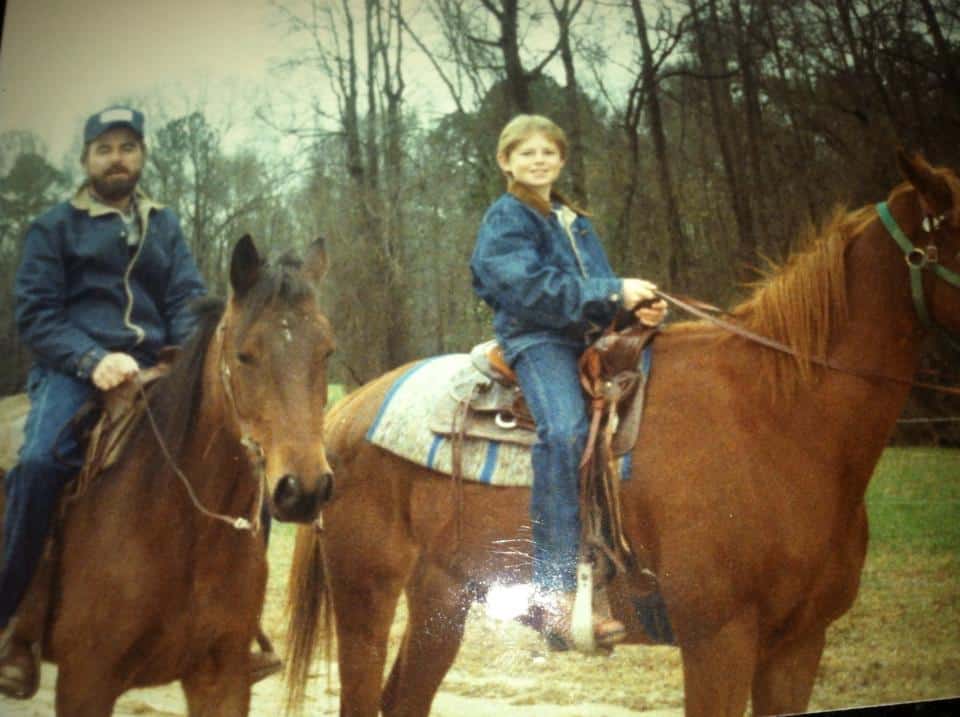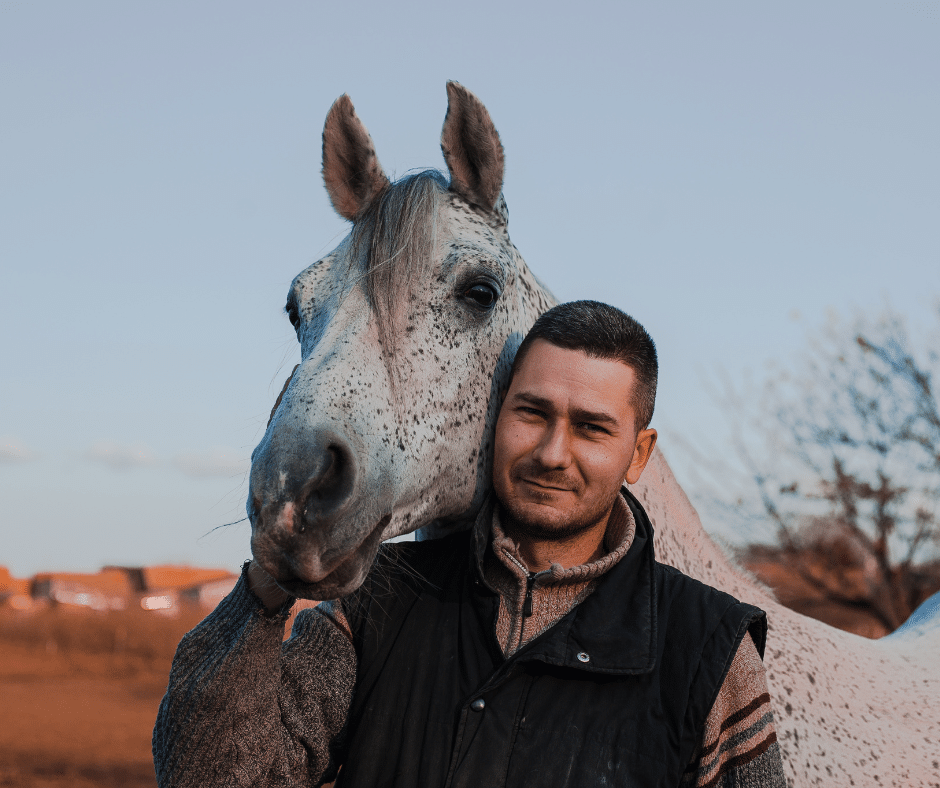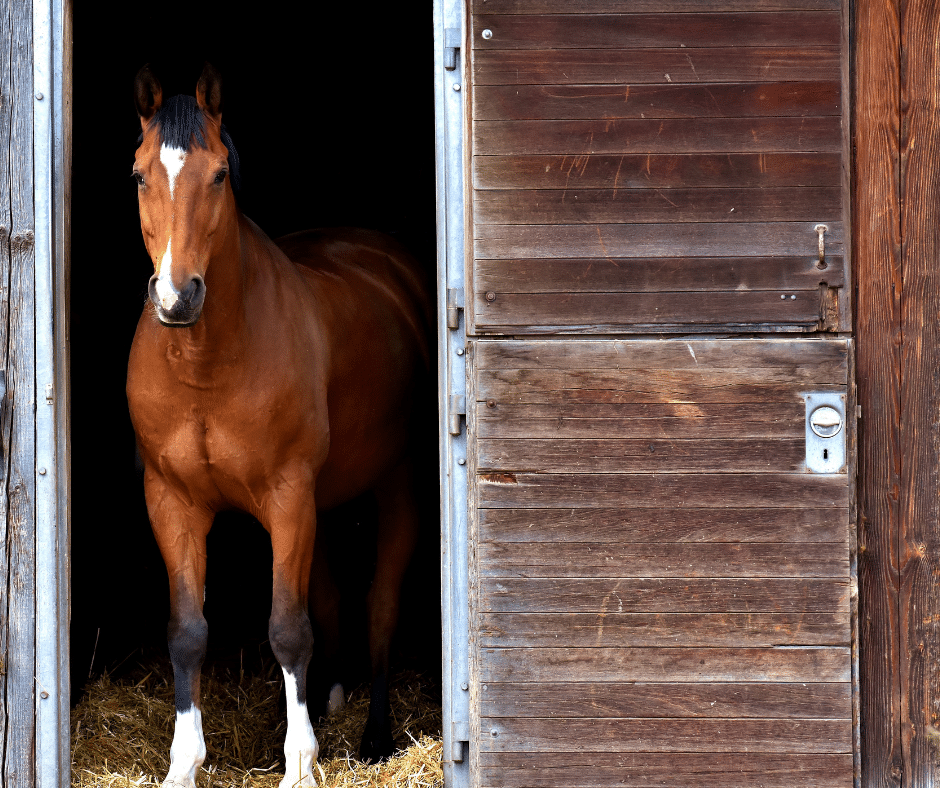Thinking About Owning a Horse?
Horse ownership for beginners doesn’t have to be daunting or overwhelming. Owning a horse certainly isn’t a decision to be taken lightly, but horse ownership can be extremely rewarding. Use this guide on horse ownership for beginners to ensure that you are ready to own a horse!
First Time Horse Owner: Questions to Ask Before Buying a Horse

Pictured - Left: My Dad Donald riding his horse. Right: Me as a young boy riding my horse.
As a potential first time horse owner, there are a few questions that you’ll need to ask yourself. The search for a horse can be daunting, but narrowing down what you’re looking for can be very helpful.
Question #1: What are you looking for in a horse?
Take an honest look at the reason that you want a horse. Are you looking for a horse as a pet? Do you need a horse that will be helpful on the farm? Knowing the reason “why” you are serious about owning your first horse is a good place to start.
Question #2: Do you have any experience with horses?
Have you ever ridden a horse? The experience level that you have with riding a horse is another important part of the equation. If you don’t have any experience at all riding, you probably don’t want to get a horse that hasn’t been trained and walk through that process on your own. Most first-time horse owners don’t have a ton of riding education or experience, so don’t be discouraged. Just keep this in mind as you want to look for a horse that already has experience so they are patient and forgiving as you learn with them.
Question #3: What’s your budget for buying a horse?
Carefully and thoroughly comb through your finances to decide on a budget for buying your first horse, and then stick to your budget. Remember, buying a horse isn’t just the cost of the horse. You’ll also want to factor in additional upfront expenses such as vet visits and tack equipment.
Question #4: How big of a horse do you want?
Knowing what size horse that you’re looking for will narrow down your selections greatly. A large horse such as a Warmblood could be a bit overwhelming for a first time horse owner. It’s a good idea to get in some riding on different size horses and determine which size makes you feel the most comfortable.
Question #5: Do you want a mare or a gelding?
In general, geldings tend to be more tolerant. As a beginner horse owner, you’ll probably make a lot of mistakes when you’re starting out riding (we’ve all been there). Mares have a reputation of being more moody - but if your heart is set on a mare, don’t let anyone discourage your decision.
Note: It’s not recommended for beginner horse owners to buy a stallion. Stallions tend to be unpredictable and require an experienced handler to own them.
Question #6: What horse breed do you want?
As a general rule of thumb, horse breed is not nearly as important in horse ownership for beginners as the temperament of a horse. All breeds have a few “bad apples” that may give them a bad rep depending on who you ask about the breed. What you’ll need to be on the lookout for is the temperament and training of the horse that you’re interested in. If you have a particular breed of horse that stands out to you, make sure to do your research.
Question #7: How old should your horse be?
There is no golden rule as to what age a horse should be for beginner horse owners. Typically, young horses will not have enough experience to make up for a first time horse owner's lack of experience. So, it may be a good idea to get a horse that’s a bit older and has experience and training. When you mix an inexperienced horse with an inexperienced horse owner, it can sometimes be a recipe for disaster.
Where to Buy a Horse?
Now that you’ve asked yourself a few questions and gotten a better idea of the horse you’re looking for, the next step is to decide where you’ll be buying your horse. There are a few different options that you could pursue when looking for a horse.
Horse Rescues
Reputable horse rescue organizations are a great resource for getting a horse for the first time. This can also be a more budget friendly option. Most of the time, you’ll only have to pay the adoption fee to adopt your horse and bring it home. Make sure that you do your research on the organization and ensure that they are certified, treat their horses well, give them proper medical and rehabilitation care, and provide them safe and clean living facilities. You’ll also want to make sure that you get a full history on any horse that you are considering adopting from a horse rescue. Their history will likely play a major role not only in their temperament, but also in their needs.
Browse Horse Rescues Near Me
Online Directories
There are hundreds of online directories for listing horses. These directories allow breeders, trainers, and horse owners to list horses for sale online. Most of these directories also allow you to filter by breed, gender, size, age, and more. When you search online, you can browse horses that are for sale closest to you to go give them a visit in person and meet them.
Horse Shows/Events
If you have an upcoming horse show event in your area and you’re looking to purchase a horse, this is a great place to stop by. Most people don’t realize that there are often horses that are for sale at horse shows. Even if you don’t blatantly see that a horse is for sale, you can get the word out there that you’re looking for a horse. There are so many horse lovers and enthusiasts at these shows that you’re sure to get some reputable sources to pursue.
Friends
This may seem silly, but any connections that you have to horse owners is a good place to start. Chances are, if you know someone that has owned a horse for any amount of time, they can give you good information on where to purchase a horse in your area.
Pro Tip: DO NOT buy a horse without getting a vet check first.
It’s also wise when buying a horse to take an experienced horse person or horse trainer with you. Taking someone with you that has more experience and knowledge will ensure that you aren’t missing any red flags. Not every seller is honest, and some people are only interested in making money.
Checklist for Bringing Home Your First Horse
Before you bring a new horse to your property, there’s a few things that need to be prepped. Follow this step-by-step checklist to make sure that your home is ready to bring home a brand new horse.
 Boarding
Boarding
First, and maybe the most important, nail down where your horse is going to stay. Are they going to stay on your property or will you be using a boarding facility? Either way, their boarding arrangements need to be taken care of before you purchase the horse.
Choose a Healthcare Team
As a horse owner, your most valuable assets will be those that help you take care of your horse. The two primary roles of a horse care team include their vet and their farrier. Do your research and choose wisely. Don’t be afraid to ask around and ask people for their opinions.
Get a Full Background Check on Your New Horse
Before you bring home a new horse, you’ll need to request all of their history from wherever you purchased them from. This includes their veterinary history, vaccine records, the current food and eating routine, as well as their exercise and turnout schedule. Knowing all this information before bringing home the horse will help to make their moving transition as smooth as possible.
Arrange Transportation
If you don’t already own a horse trailer, it’s a good time to get purchasing one on your radar. When shopping for a horse trailer, it’s important to choose an option that is designed with safety features for your horse. Since most first time horse owners start with one horse, a small bumper pull trailer is a good entry-level trailer option. Most one horse bumper pull trailers can be towed with full sized SUVs.
Need help designing a horse trailer? Use this handy trailer finder tool.
Of course, if investing in a horse trailer isn’t something that you’re ready for, there are also horse transportation services. Just make sure that you have transportation lined up before you pick up your horse.
Read more: 6 Reasons Why a Single Horse Trailer is Perfect for You!
Things to Buy for a First Time Horse Owner
-
First aid kit
-
Grooming supplies
-
Tack (saddle, bridle, saddle pad)
-
Feeding bowls
-
Water buckets/water trough
There are a ton of horse supplies out there, so don’t be overwhelmed and feel like you need to buy everything all at once. Start out with the basic necessities and you can always buy when you see a need for something.
Beginner Horse Owner: What to Look For
When it’s finally time to bring your horse to their new home with you, keep in mind that this can be a lot for a horse to handle. Traveling, moving environments, getting used to a new person, can all cause a horse to be distressed. Some horses will handle the transition extremely well, while others will need to be closely monitored to ensure that they are maintaining their health. A few things to be on the lookout for:
-
Sudden weight gain or weight loss
-
Diarrhea or digestive issues
-
Sudden changes in temperament/mood swings
-
Signs of aggression
-
Grinding their teeth
-
Abnormal movements (frequent bolting or jumpiness)
If you are concerned that your new horse may be showing signs of extreme stress, contact your veterinarian immediately.
Bonus: 7 Tips for Beginner Horse Owners
Tip #1: DON’T be afraid to ask for help
One of the most common and largest mistakes in horse ownership is being afraid to ask for help. Just because you are a first time horse owner, doesn’t mean that you have to be an isolated horse owner. The horse community is filled with helpful and knowledgeable people who have been in your shoes before. When in doubt, ask!
Tip #2: Take some riding lessons
Particularly if you are inexperienced, it’s a great idea to take some riding lessons with your new horse from a professional. A good trainer will be able to help you learn basic horsemanship and riding skills.
Tip #3: Set aside lots of bonding time
Particularly in those first few weeks and months of transition, be sure to allow for plenty of time for bonding with your new horse. Spending the extra quality time with them will make the adjustment easier for them, and it’s also helpful for you. The more time that you spend with your horse, the more you’ll get to know them.
Tip #4: Find a community

Tip #5: Invest in good equipment
There are a lot of things in life that you can get away with skimping on, but good tack equipment is not one of them. Although we all appreciate saving money, both you and your horse will appreciate you investing in quality gear. Not only will both of you be more comfortable, but properly fitted and quality equipment can save you money in the long run. Ill fitted equipment can cause physical damage to your horse.
Tip #6: Get on a regular vet schedule
To maintain your horse’s health, getting on a regular schedule with your vet is important. You should set your horse up on at least an annual schedule for a physical veterinarian check, and also make sure that they stay up-to-date on all vaccines. While you’re scheduling the annual vet visit, go ahead and get on your farrier’s calendar, too!
Tip #7: Give yourself some grace
Horse ownership is a marathon, not a sprint. You will make mistakes, you might get frustrated with your horse, and your horse might get frustrated with you. It may take some time, but you and your new horse will bond and get to know each other. Don’t be discouraged if you don’t immediately have a strong bond or have to work out some kinks.
The Bottom Line on Horses for Beginners
Owning a horse can be challenging, but it can also be so much fun! The most important thing when learning about horses for beginners is preparation. You can never be too prepared, or too well-researched. Take your time and don’t make any hasty decisions when searching for your four-legged friend.
Frequently Asked Questions
Should a beginner buy a horse?
A beginner horse rider can absolutely buy a horse. However, it is a good rule of thumb that an inexperienced rider should never be with an inexperienced horse. Look for a horse that is a bit older and has training.
How much does it cost to buy a horse?
Depending on which method that you choose to purchase a horse, a horse can range anywhere from $500 to upwards of $10,000. First time horse owners should keep in mind that owning a horse is an ongoing expense, not a one time fee. There will always be maintenance and care costs with owning a horse.
What is the best age to purchase a horse?
A horse is considered to be in its prime age to be purchased by a beginner horse owner between the ages of 5-16.
Is it hard to own a horse?
Horse ownership is not difficult, but it is a big commitment. Horses require a lot of maintenance, attention, work, and of course, money. Before purchasing a horse, consider the huge responsibility and financial commitment that you are taking on.
When can I ride my new horse?
After bringing a new horse home, you should give them 24-48 hours to get adjusted before you attempt to ride them. You may need to wait even longer if they’re showing signs of stress, or having a hard time transitioning.
How long should it take to bond with my horse?
Bonding with a new horse can take anywhere from weeks, months, to years. Don’t pressure yourself if you and your horse don’t bond immediately. It takes time, patience, and work.

 Boarding
Boarding